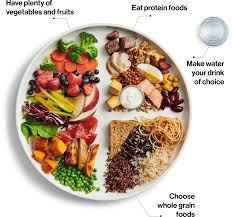The 2019 Canadian Food Guide.
The Food guide makes some recommendations specific to all life stages, including for seniors. Specific recommendations on how to meet nutrient requirements and what they are exactly stays a bit murky. To clear that up, the food guide recommends that “Individuals with specific dietary requirements may need additional guidance or specialized advice from a dietitian.” And in here lies the answer.
About half of the population 65+ and older have at least one chronic disease, meaning that half of that population indeed may have very specific dietary requirements. This is why staying well-nourished get tricky. Once you have a chronic disease, your nutrient needs change. We are less active, so we need less calories. Yet, we need more protein, vitamins and minerals to stay well. Some of us need to follow a doctor prescribed diet to manage troublesome symptoms. Popular science and conflicting information can be confusing causing distrust in nutrition science.
 The need for specialized advice from a dietitian should not be taken lightly. The impact of not meeting your nutrition needs can be serious. Not getting enough protein can result into loss of muscle mass, balance, strength and falls. Not getting enough vitamins and minerals can result into more infections, slowed wound healing, anemia and feeling unwell or depressed. Your nutrition needs are just as specific as your medication needs, and require the attention of a dietitian to “prescribe” how you can meet your nutrition needs.
The need for specialized advice from a dietitian should not be taken lightly. The impact of not meeting your nutrition needs can be serious. Not getting enough protein can result into loss of muscle mass, balance, strength and falls. Not getting enough vitamins and minerals can result into more infections, slowed wound healing, anemia and feeling unwell or depressed. Your nutrition needs are just as specific as your medication needs, and require the attention of a dietitian to “prescribe” how you can meet your nutrition needs.
As a registered dietitian, I look for certain signs that someone is not meeting their nutrition needs, such as unintended weight loss, skipped meals, poor appetite, slow gait, feeling tired, or changes in mood. Often these signs are perceived as normal signs of aging, but they can also be caused by an underlying condition. A nutrition assessment can determine how these symptoms can be best managed by addressing your specific nutrient needs. A full nutrition assessment considers your medical condition(s), activity level, medications and lifestyle choices. To meet your nutrient needs the dietitian may create a personalized menu, recipes, meal plan, care plan for care givers, and even recommend a meal service.
There are many free resources available to assist you such as:
- Dial a dietitian (811).
- Nutrition workshops, fun activities to stay active for seniors of all ages and abilities, and other community resources, can be found at the local senior centres.
- Your family doctor can a refer to an outpatient dietitian when are diagnosed with a chronic disease, to get clarity in making the necessary life style changes.
- Contact your local health unit if you require a visit from a community dietitian, especially after a recent hospital stay.
Private dietitian consultations may be covered under your extended health insurance. To find a dietitian search Dietitians of Canada for a Dietitian in your area. Not all dietitians specialize in senior nutrition, so please search for “senior nutrition” or “geriatric” dietitians. If you want to learn more you can contact me at 250 415 5444, or email me at jenneke@therapeuticmeals.com
 Jenneke van Hemert a registered dietitian who specializes in meal preparation for people with dementia, swallowing or chewing difficulty, and chronic disease management. Meal delivery service is available. If you like to find out more about this topic or her services, please visit www.therapeuticmeals.com
Jenneke van Hemert a registered dietitian who specializes in meal preparation for people with dementia, swallowing or chewing difficulty, and chronic disease management. Meal delivery service is available. If you like to find out more about this topic or her services, please visit www.therapeuticmeals.com

